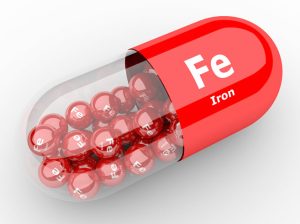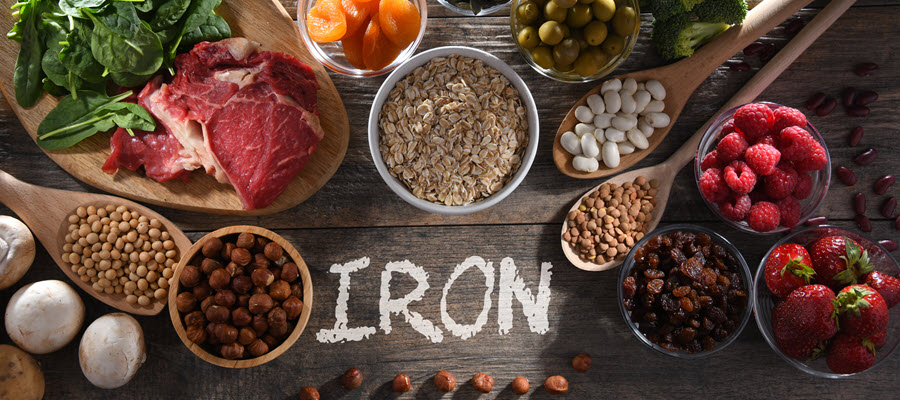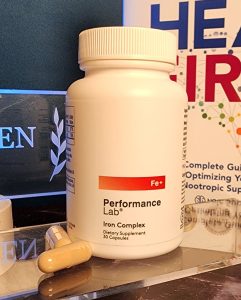Table of Contents
Key Takeaways
- Iron is Essential for Brain Function: It supports oxygen transport, neurotransmitter production, and energy metabolism.
- Iron Deficiency Affects Cognition: Lack of iron can lead to poor memory, fatigue, cognitive impairment, anxiety and depression.
- Balance is Critical: Both iron deficiency and excess iron accumulation can harm brain health, including neurodegenerative diseases such as Alzheimer’s and Parkinson’s.
- Supplement Wisely: Iron supplementation can help if you have low iron or ferritin levels, but it’s critical to understand dosage recommendations, including how much iron you are getting from your diet.
- Diverse Supplement Options: Various iron supplement forms, such as ferrous sulfate, gluconate, and fumarate, offer options based on what your system can tolerate. But verify your iron status with your doctor before supplementing with iron.
Iron is an essential mineral for brain function. Iron plays a key role in hemoglobin production which carries oxygen via red blood cells throughout your body and brain.
Iron is a cofactor in the synthesis of neurotransmitters and myelin.[i] Iron is needed for DNA synthesis and repair, ATP production in mitochondria, immune response, and thyroid hormone production.
You need adequate iron for maintaining cognition and a healthy brain. In this post, we’ll explore why iron intake is essential, how it impacts brain function, and what happens when levels are too low or too high.
You will learn the consequences of iron deficiency, its benefits for cognitive function, relevant clinical research, recommended dosages, potential side effects, and the type of iron supplement to buy to add to your nootropic stack.
Iron helps:
- Mental and physical energy – Iron helps transport oxygen and electrons throughout your body and brain which is used in the synthesis of adenosine triphosphate (ATP), your main energy supply provided by your mitochondria.
- Neurotransmitters and myelin – Iron contributes to the product of major neurotransmitters such as dopamine. And the synthesis of myelin, the protective sheath around axons and ensuring optimal brain cell signaling.
- Antioxidant – heme iron helps protect cells from the accumulation of hydrogen peroxide by converting it water and oxygen.
What is Iron?
Iron is an essential mineral needed for producing hemoglobin, a protein in red blood cells that transports oxygen from your lungs and throughout your body and brain.
 Once iron is absorbed in your digestive system, a portion of it is stored in Ferritin. This protein is found throughout your body and stores iron which then releases this mineral as needed.
Once iron is absorbed in your digestive system, a portion of it is stored in Ferritin. This protein is found throughout your body and stores iron which then releases this mineral as needed.
Iron that is not stored in ferritin is released into your bloodstream via a protein called transferrin. This protein is important because it prevents iron from forming free radicals which can cause oxidative stress and kill cells.
Iron is required for DNA synthesis, electron transport for cellular energy production in mitochondria, antioxidant functions including reduction of Reactive Oxygen Species (ROS), and production of thyroid hormones.[ii]
Your body does not make iron so you must get it from food or a supplement. Foods rich in iron include beef, veal, pork, lamb, chicken, turkey, liver, fish, greens, broccoli, Brussel sprouts, tomatoes, lima beans, potatoes, green beans, corn, beets, and cabbage.
Heme iron comes from meat, poultry and fish. Nonheme iron comes from plants, dairy products, meat, and iron salts added to food and supplements. The absorption of nonheme iron is increased by Vitamin A, Vitamin C, citric, malic, tartaric, and lactic acids, and meat, poultry, and fish.
Legumes, whole grains, nuts, and seeds inhibit nonheme absorption. Compounds in coffee, black and herbal tea, soy protein and calcium all inhibit nonheme iron absorption.[iii]
Iron from your diet or from supplementation ensures iron distribution across different brain regions, preventing cognitive impairment and maintaining brain health.
 How Does Iron Work in the Brain?
How Does Iron Work in the Brain?
Iron boosts brain health and function in several ways. But two in particular stand out.
- Mental energy: Iron is used in your body to make hemoglobin, a protein in red blood cells that carries oxygen from your lungs to the rest of your body. When your iron levels are low, less oxygen is carried throughout your system including your brain. Causing mental and overall fatigue.
The University of Lausanne in Switzerland conducted a study with 136 non-anemic women suffering from fatigue. Most had low ferritin concentrations. Half the women were given 80 mg ferrous sulphate every day for a month.
The level of fatigue dropped significantly in the women who supplemented with iron compared to the placebo group. The researchers concluded, “Non-anemic women with unexplained fatigue may benefit from iron supplementation.”[iv]
- Exercise and endurance training: Multiple studies since the early 1990’s have shown iron losses and deficiency in both men and women who engage in exercise. Especially endurance training or long-distance runners.
Studies show iron loss in athletes is likely due to expanding blood cell mass and muscle mass. Increased bleeding in the gastrointestinal tract, or increased fragility of red blood cells may also cause iron deficiency in athletes.
The Food and Nutrition Board estimates that the iron requirement on average may be 50% higher for those who engage in regular intense exercise.[v]
How Things Go Bad When You Have an Iron Deficiency
Iron-deficient anemia impacts somewhere between 1 – 2 billion people worldwide. In developing countries the most effected are pregnant women and children.[vi]
 The World Health Organization (WHO) reports that about 1/3 of the world’s population is anemic.
The World Health Organization (WHO) reports that about 1/3 of the world’s population is anemic.
Iron deficiency can be caused by congestive heart failure, chronic kidney disease, inflammatory bowel disease, menstruation, and not enough iron in your diet.[vii]
- Childhood iron deficiency: Insufficient iron in the first years of life can turn into long-term problems. Anemic (iron deficiency) children in infancy scored lower on learning, self-control, and attention at 7 years of age compared to infants with good iron status.[viii]
- Cognitive Decline: Lack of iron can lead to difficulties in concentration, memory lapses, and decreased mental clarity.[ix]
- Restless Leg Syndrome: Magnetic resonance imaging (MRI) has shown that low iron content in the basal ganglia decreases the binding potential of dopamine to its receptors and transporters. This impaired dopamine signaling disrupts normal motor function, leading to involuntary leg movements, including Restless Leg Syndrome.[x]
- Mood Disorders: Adults with brain iron deficiency experience cognitive decline, fatigue, mood swings, irritability, and an increased risk of depression.[xi]
- Neurodegenerative Diseases: Chronic iron deficiency and improper iron handling may contribute to neurodegenerative diseases like Parkinson’s Disease and Alzheimer’s due to brain iron accumulation in specific brain regions.[xii]
- Stroke Risk: A study in China showed an association between low iron and hemoglobin and were contributing factors for stroke risk.[xiii]
Studies show that iron accumulation in certain brain regions have been linked to both improved memory and cognitive performance. While excessive accumulation in other regions may contribute to neurodegenerative diseases like Alzheimer’s and Parkinson’s.
Iron supplementation is not for everyone. But if you are iron deficient, adding iron to your nootropic stack could improve your quality of life.
Iron Benefits for Brain Health and Cognition
Maintaining adequate iron levels offers several cognitive benefits:
- Memory: Proper iron levels support memory retention and recall and prevents cognitive decline.
- Improved Attention: Iron contributes to improved focus and concentration by supporting normal brain function.
- Optimal Learning: Adequate iron is essential for learning processes and overall cognitive development.[xiv]
A meta-analysis of nine studies with 1196 children in five countries concluded “Oral iron intake can improve the intelligence test scores of children and adolescents in Low and Middle Income Countries and should be considered for future nutritional interventions.”[xv]
 How does Iron feel?
How does Iron feel?
If you are iron deficient or anemic and start supplementing with iron, don’t expect immediate results. It can take a few months to increase your ferritin levels.
Iron supplementation may reduce restless leg syndrome.
Once you begin supplementing with iron you should no longer feel dizzy or light headed. And should not bruise as easily.
Your energy levels may increase, circulation should improve, and you’ll no longer feel cold all the time.
Many women complain about hair loss while pregnant and after giving birth (postpartum). You may be able to avoid these symptoms by supplementing with iron.
Many report a reduction in hair loss. Hair feels thicker and healthier after supplementing with iron.
You should feel less groggy, more focused, and no brain fog.
Keep in mind that caffeine and even dairy products can interfere with iron absorption. So separate your coffee or dairy intake by a couple of hours to ensure your iron supplement gets into your system.
Get your labs done and consult with your doctor while figuring out how much iron you should be using.
And experiment with different forms of iron if you experience constipation or gut health issues. Iron purity is important as is the type of iron supplement you choose to use.
Iron Clinical Research
Iron Supplementation for Chronic Fatigue
Chronic fatigue is a significant problem and a debilitating condition that has been estimated to cost society in the USA 9.1 billion dollars a year in lost production.[xvi]
Researchers at the University of Manitoba in Winnipeg, Canada ran a systematic review of clinical trials published between 1989 and 2015 with study participants who were iron deficient but not anemic.
The analysis included 18 clinical trials enrolling 1170 patients who were diagnosed as iron deficient. The study was conducted to find out if iron supplementation could improve fatigue and physical capacity in adults who were iron deficient but not anemic.
The majority of study participants supplemented with ferrous sulfate with a mean daily dose of 86.9 mg elemental iron for 28 days.
The researchers concluded that in iron deficient but non-anemic adults, iron supplementation reduced fatigue but did not improve exercise capacity.
And they said, “patients and practitioners could consider consumption of iron-rich foods or iron supplementation to improve symptoms of fatigue in the absence of documented anemia.”[xvii]
Iron Supplementation Effect on Cognitive Function in Children
Decades of evidence shows that iron deficiency is closely related to delayed brain development, worse school performance, and problems with behavior.
So researchers in China and the United States conducted a systematic review and meta-analysis to examine the effect of oral iron supplementation on cognitive function among children and adolescents aged 5 to 19.
Cognitive function was defined as intelligence, attention, short-term memory, long-term memory, and school performance. The review included 9 studies with 1196 participants in 5 countries.
The researchers found that iron supplementation had a positive effect on intelligence among children. And intelligence test scores improved with increasing the iron supplement dose.
The researchers concluded, “Oral iron intake can improve the intelligence test scores of children and adolescents and should be considered for future nutritional interventions.”[xviii]
Iron Recommended Dosage
Iron can be toxic and unsafe if you supplement with iron but are not iron deficient or anemic.
The recommended daily allowance (RDA) for iron varies based on age, gender, and life stage. The table below lists the current RDA for nonvegetarians.
The RDAs for vegetarians are 1.8 times higher than for people who eat meat. Because the heme iron from meat is more bioavailable than nonheme iron from plant based foods. And meat, poultry and seafood increase the absorption of nonheme iron.[xix]
| Age | Male | Female | Pregnancy | Lactation |
| Birth to 6 mos. | 0.27 mg | 0.27 mg | ||
| 7 – 12 mos. | 11 mg | 11 mg | ||
| 1 – 3 years | 7 mg | 7 mg | ||
| 4 – 8 years | 10 mg | 10 mg | ||
| 9 – 13 years | 8 mg | 8 mg | ||
| 14 – 18 years | 11 mg | 15 mg | 27 mg | 10 mg |
| 19 – 50 years | 8 mg | 18 mg | 27 mg | 9 mg |
| 51 + years | 8 ng | 8 mg |
The tolerable upper limit for iron for infants and children up to 13 years is 40 mg per day. And for adolescents and adults 14 years and older it is 45 mg per day.
How to Read Your Iron Labs
Your iron lab panel should look similar to this:
 Hemoglobin (Hb, Hgb, H&H) – measures levels of hemoglobin in your blood. This iron-rich protein in red blood cells carries oxygen from your lungs to the rest of your body and if it is low, you could be iron deficient or anemic – this is not the same as Hemoglobin A1C which measures glucose levels.
Hemoglobin (Hb, Hgb, H&H) – measures levels of hemoglobin in your blood. This iron-rich protein in red blood cells carries oxygen from your lungs to the rest of your body and if it is low, you could be iron deficient or anemic – this is not the same as Hemoglobin A1C which measures glucose levels.
MCV (mean corpuscular volume) – the size of your red blood cells and if below normal it could indicate iron deficiency.
MCHC (mean corpuscular hemoglobin concentration) – this is the average hemoglobin concentration in a single red blood cell and if it’s low you could be iron deficient.
Serum Iron – measures levels of iron in your blood
Transferrin / TIBC – measures how well iron attaches to the transferrin protein that is used to move iron throughout your body. Also called total iron binding capacity (TIBC). When it’s high you could be iron deficient and when low it could mean iron overload.
Transferrin Saturation (TSI) – is the percentage of transferrin that is bound to iron. This is a more accurate measure of total iron levels in your body than the serum iron concentration. Low saturation could mean iron deficiency or anemia, and high saturation could mean iron overload or hemochromatosis.
Ferritin – is an iron storage protein and its levels indicate your total body stores of iron. If it’s low, you could be iron deficient and if it’s high it could be an iron overload.
You should not supplement iron unless you have been diagnosed with iron deficiency.
Iron Side Effects
Iron supplementation may cause gastrointestinal irritation, diarrhea, constipation, nausea, or vomiting.
While iron is critical for optimal brain health and cognition, excess iron can cause problems.
Accidental overdose of iron is the single largest cause of poisoning fatalities in kids under 6.
Iron overdose at any age can lead to nausea, vomiting, weak and rapid pulse, low blood pressure, fever, difficulty breathing, and coma.
Iron Supplement and Drug Interactions
Antacids, histamine receptor antagonists, and proton-pump inhibitors can prevent iron absorption.
Sinemet, levodopa, Synthroid, tetracyclines, penicillamine, drugs used to lower blood cholesterol, and Quinolone antibiotics can slow iron absorption so it’s best to take iron and any of these drugs a couple of hours apart.
Vitamin A and Vitamin C taken with an iron supplement reduces anemia better than taking iron alone.[xx]
Copper deficiency can lead to iron overload and cirrhosis of the liver.
High doses of an iron supplement taken together with zinc on an empty stomach may inhibit the absorption of zinc. But if taken with food, supplemental iron does not inhibit iron absorption.
Best Type of Iron to Buy
You have several options when choosing an iron supplement. Some of those options include:
- Ferrous Sulfate (20% elemental iron): A common and less expensive form with high bioavailability.
- Ferrous Gluconate (12% elemental iron): usually sold in liquid form and is easier for your body to absorb compared to Ferrous Sulfate. This form of iron can be easier on your stomach, and a better option of you are highly sensitive to supplements.
- Ferrous Fumarate (33% elemental iron): Contains a higher percentage of elemental iron.
- Iron Chelators: These iron supplements are bound to a chelator which is an organic molecule that is large enough to enrobe the iron. This protects the iron against degradation, is highly stable, and may improve iron uptake and utilization.
Choosing the right iron supplement can be confusing because you’ll often find two Iron amounts listed on the Supplement Facts label.
 The larger number represents the chemical compound form with iron bound to a salt (i.e. ferrous sulfate).
The larger number represents the chemical compound form with iron bound to a salt (i.e. ferrous sulfate).
The smaller number represents the amount of iron in the supplement which is often called “elemental iron”. This smaller number is important because this is the exact amount of iron available for your body to absorb.
IF you have been diagnosed with iron deficiency and your doctor recommends that you start an iron supplement, make sure you are clear on how much iron your doctor is prescribing. Make sure she is referring to the amount of “elemental iron” you should be using.
I recommend Performance Lab® Iron Complex because it contains 14 mg NutriGenesis® Iron with 60 mg NutriGenesis® Vitamin C to boost absorption.
This form of iron is in its “elemental” form and does not need to be combined with a salt to increase absorption or act as a carrier. Because this is the same form of Iron as you would get from food.
Nootropics Expert® Recommendation
 I recommend using Iron as a nootropic supplement but ONLY if you are iron deficient.
I recommend using Iron as a nootropic supplement but ONLY if you are iron deficient.
Your body does not make Iron on its own. So to get its benefits it needs to come from your diet. Or you must take it as an Iron supplement.
Iron is critical for oxygen delivery throughout you body and brain.
Iron is required for dopamine production, ATP synthesis in mitochondria, as an antioxidant, for myelin synthesis, and learning and memory.
Iron supplementation is especially important if you do endurance training or long-distance running.
And it is critical if you are iron deficient or anemic. Check your iron labs if you think you may be deficient.
As an important nootropic supplement, and if you need to supplement with iron, I highly recommend Performance Lab® Iron Complex because it contains 14 mg NutriGenesis® Iron with 60 mg NutriGenesis® Vitamin C to boost absorption.
This form of iron is in its “elemental” form and does not need to be combined with a salt to increase absorption or act as a carrier. Because this is the same form of Iron as you would get from food.







Join The Discussion - 2 comments
Helena Utsch
May 7, 2025
Hi David,
Thanks very much for sharing your knowledge about iron with us! After a long discussion with my doctor she gave me an iron ferrous prescription. But I’m still very confused about my lab results. Could you give an advice? As I feel tired all the time, out of breath and dizzy when exercising. Also, I do have heart palpitations time to time. I believe I need IV iron therapy.
LAB TEST 21/01/25
*Ferritin: 24.2 (10 – 120)
Transferin: 3.03 (2.0 -3.6)
MCV: 91.1 (83.0 – 97.2)
MCHC: 338 (320 – 345)
Hemoglobin: 137 (119 -157)
B12: 395 (138 – 652)
DATE 30/04/25
My ferritin is: 36.9 (after 2 months of supplementation).
IRON: 37
TIBC: 62
UIBC: 25
Saturation transferin : 59.677. ..
Thanks very much! Helena
David Tomen
May 9, 2025
Helena, I’m not the expert on Iron as much as these guys are: https://stopthethyroidmadness.com/lab-values/. And see her page here as well: https://stopthethyroidmadness.com/iron/